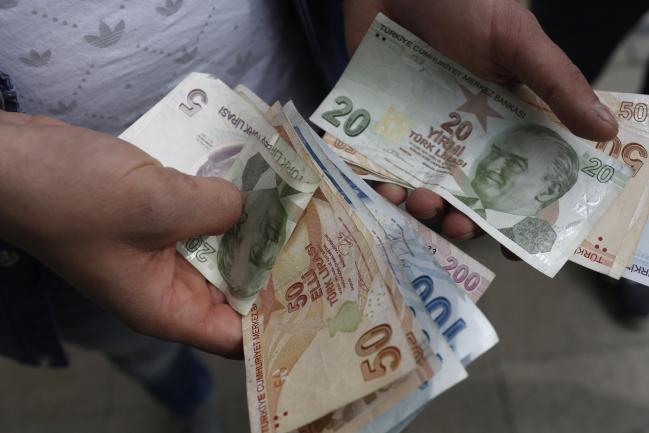(Bloomberg) -- Turkey entered a full-blown financial meltdown on Friday, sending tremors through global markets, after President Recep Tayyip Erdogan declared his refusal to bow to U.S. political demands and market pressures.
The unraveling was swift, highlighting the fragility of Turkey’s economy after years of a growth-at-all-costs policy bias that left its companies saddled with hundreds of billions of dollars in foreign debt. The lira plunged as much as 17 percent on Friday alone, bringing its loss for the year to 42 percent and raising the specter of contagion into Europe and across other emerging markets.
While the trigger was U.S. sanctions for Turkey’s imprisonment of an American pastor, many investors say the $900 billion economy was already headed toward a cliff, and only needed a push. The sell-off represented a vote of no-confidence in a new system of government that handed Erdogan unrivaled authority, essentially paralyzing the bureaucracy in Ankara.
“This is a textbook currency crisis that’s morphing into a debt and liquidity crisis due to policy mistakes," said Win Thin, a strategist at Brown Brothers Harriman & Co. in New York. “The way things are going, markets need to be prepared for a hard landing in the economy, corporate defaults on foreign currency debt, and possible bank failures.”
With the turmoil in Turkey fueling contagion fears, investors shunned riskier assets and sought safety in developed nations’ bonds. Treasuries and bunds rallied. South Africa’s rand, the Argentine peso and global stocks fell. The euro sank as much as 1.2 percent to the weakest in a year against the U.S. dollar amid concern about European exposure to Turkish banks.
Extreme Measures
Investors are now saying that only extreme measures could bring Turkey back from the abyss. Previously taboo topics like an international bailout or the imposition of capital controls are now being discussed privately in Turkish financial circles. There were also signs of panic setting in among Turkish citizens. Visits to three different bank branches in Istanbul on Friday indicated that requests for foreign-currency withdrawals had skyrocketed; and each of the three banks reported that they were in need of more cash from headquarters.
If they were intended to calm markets, two speeches by Erdogan and another by his son-in-law, the newly appointed economic czar, had the opposite effect. Erdogan was defiant about Turkish resistance to what he calls a financial attack, though he seemed to pointedly avoid openly escalating tensions with the U.S. or naming President Donald Trump. Berat Albayrak, the minister, gave a presentation largely devoid of figures or specifics.
Erdogan’s Riposte
“Those who assume they can bring us to our knees through economic manipulations don’t know our nation at all,” Erdogan said at his Black Sea hometown of Gumushane, where he was breaking ground for a new roadway. He said Turkey could achieve record economic growth in 2018, “despite all the attacks staged against our country through foreign exchange rates."
What started as financial turmoil is showing signs of spilling over into the rest of the economy. Turkey’s private companies have borrowed heavily in foreign currencies and now sit on a pile of debt equivalent to about 40 percent of yearly economic output. Over the past year, several of the nation’s largest and most respected conglomerates have requested restructurings of billions of dollars in foreign debt, and more are sure to follow.
“The key to any hope of Turkish stability is the ability for banks to roll over syndicated loans,” said Paul McNamara, a money-manager at GAM UK in London. “So far, that’s been absolutely fine."
Still, banking shares slid 6.5 percent on the Turkish stock exchange on Friday, bringing their decline this year to 36 percent. Investors are now betting that they’ll be hit by a toxic cocktail of slowing growth, rising bad loans and markedly higher interest rates.
On borrowing costs, investors now believe that Turkey’s central bank will have to flout Erdogan’s desires and announce a significant increase to its benchmark 17.75 percent benchmark rate just to stop the currency’s freefall to levels that had been unimaginable even a month ago.
“Seems like a complete crash, so they need to act now,” said Morten Lund, a strategist at Nordea Bank AB in Copenhagen. “The lira will keep falling if they don’t hike rates today.”
An aggressive rate hike by the central bank, on the order of 1,000 basis points, would be a “good start” at this point, according to Paul Greer, a money manager at Fidelity International in London.
On the U.S. side, Trump tweeted his analysis of the situation: "Our relations with Turkey are not good at this time!"
